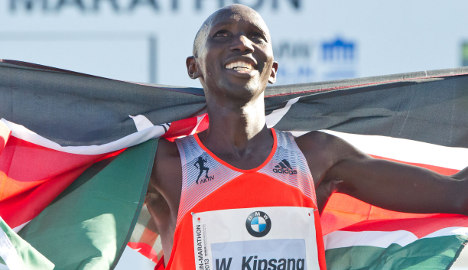Kipsang, 31, shaved 15 seconds off the previous world record set by compatriot Patrick Makau, who ran 2:03.38 over 42.195 kilometres in the German capital two years ago.
Having said in the build up that he was running to break the world record in Berlin, Kipsang was true to his word.
“I think in the last few kilometres I had the feeling it was on and I was feeling strong,” said Kipsang, who collected the winner’s cheque of €40,000 with a €50,000 bonus for the world record.
“My plan was to really push in the last few kilometres, I knew it would be
a fight. I just wanted to make sure we had a good pace at the start and I knew the record was beatable,” he said. “It was my first time racing here, it’s a really nice course and a great city. I love it here.”
Kenya’s Eliud Kipchoge, who won the Hamburg marathon in April on his debut over the distance, finished second in a personal best time of 2:04.05 with compatriot Geoffrey Kipsang third with 2:06.26.
It is the ninth time a world record has been set in Berlin and five men’s world records have been set here in the last decade alone.
Makau was missing in the German capital having withdrawn a fortnight ago with a knee injury.
The women’s race was won by Kenya’s Florence Kiplagat, the 2011 Berlin winner, in an official time of 2hrs 21mins 13secs, six minutes off Paula Radcliffe’s world record set ten years ago in London
Germany’s Irina Mikitenko finished third to break the world masters record for the over 40s, in a time of 2:24.54.
Having trained specifically to break the world record here, Kipsang, the Olympic bronze medallist, broke away from the leading pack in the final 10 kilometres and ran his own race, chased by Kipchoge.
The elite group had been on world record pace up until the 29km, but when the tempo dropped, Kipsang took matters into his own hands and was three seconds under the necessary pace in the final two kilometres.
Having run a previous personal best in 2011 when he went within Makau’s previous world record in Frankfurt, Kipsang added the Berlin title to his CV having won the London marathon in 2012.
AFP



 Please whitelist us to continue reading.
Please whitelist us to continue reading.
Member comments